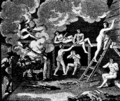Introduction

Nudity is the state of being in which a human is without clothing. While estimates vary, for the first 90,000 years of pre-history, anatomically modern humans were naked, having lost their body hair and living in hospitable climates. As humans became behaviorally modern, body adornments such as jewelry, tattoos, body paint and scarification became part of non-verbal communications, indicating a person's social and individual characteristics. Indigenous peoples in warm climates used clothing for decorative, symbolic or ceremonial purposes but were often nude, having neither the need to protect the body from the elements nor any conception of nakedness being shameful. In many societies, both ancient and contemporary, children might be naked until the beginning of puberty. Women may not cover their breasts, being associated with nursing babies more than with sexuality.
In the ancient civilizations of the Mediterranean, from Mesopotamia to the Roman Empire, proper attire was required to maintain social standing. The lower classes might possess a single piece of cloth that was wrapped or tied to cover the lower body; the lowest classes including slaves might be naked. However, through much of Western history until the late modern period, people of any status were also unclothed by necessity or convenience when engaged in labor and athletics; or when bathing or swimming. Such functional nudity occurred in groups that were usually but not always segregated by sex. Although improper dress might be socially embarrassing, the association of nudity with sin regarding sexuality began with Judeo-Christian societies, spreading through Europe in the post-classical period. Traditional clothing in temperate regions worldwide also reflect concerns for maintaining social status and order, as well as by necessity due to the colder climate. However, societies such as Japan and Finland maintain traditions of communal nudity based upon the use of baths and saunas that provided alternatives to sexualization.
The spread of Western concepts of modest dress is part of colonialism, and continues today with globalization. Contemporary social norms regarding nudity reflect cultural ambiguity towards the body and sexuality, and differing conceptions of what constitutes public versus private spaces. Norms relating to nudity are different for men than they are for women. Individuals may intentionally violate norms relating to nudity; those without power may use nudity as a form of protest, and those with power may impose nakedness on others as a form of punishment. (Full article...)
Selected general article
In film, nudity may be either graphic or suggestive, such as when a person appears to be naked but is covered by a sheet. Since the birth of film, depictions of any form of sexuality have been controversial, and in the case of most nude scenes, had to be justified as part of the story.
Nudity in film should be distinguished from sex in film. A film on naturism or about people for whom nudity is common may contain non-sexual nudity, and some non-pornographic films contain brief nude scenes. Nudity in a sexual context is common in pornographic films or erotic films.
Nude scenes are considered controversial in some cultures because they may challenge the community's standards of modesty. These standards vary by culture and depend on the type of nudity, who is exposed, which parts of the body are exposed, the duration of the exposure, the posing, the context, or other aspects. (Full article...)
Did you know...
- ... that Joseph II, Holy Roman Emperor, caused outrage in 1784 when he ordered that people be buried naked in reusable coffins from which the body fell into the grave via a trapdoor?
- ... that two nude bathers in Arnold Comes of Age were "nearly obliterated"?
- ... that having painted a domestic scene depicting his nude wife, Robert Ballagh felt that he had to produce a nude painting of himself as a follow-up?
- ... that vampire amoebae are naked?
- ... that according to one Turkish artist, a nude sculpture by Gürdal Duyar almost dissolved the 37th government of Turkey?
- ... that Loud LDN co-founder Maisi came joint last in the 2022 Maldon mud race, behind a naked runner who had been forced to start after everyone else?
- ... that Chris Ernst stripped naked in 1976 with her Yale University teammates to protest the lack of showers for the women's rowing crew?
- ... that the Indian politician Diwan Chaman Lall failed to get rid of the painting Nude of Indira?
Need help?
Do you have a question about Nudity that you can't find the answer to?
Consider asking it at the Wikipedia reference desk.
Get involved
For editor resources and to collaborate with other editors on improving Wikipedia's Nudity-related articles, see WikiProject Nudity.
Subtopics
Associated Wikimedia
The following Wikimedia Foundation sister projects provide more on this subject:
-
 Commons
Commons
Free media repository -
 Wikibooks
Wikibooks
Free textbooks and manuals -
 Wikidata
Wikidata
Free knowledge base -
 Wikinews
Wikinews
Free-content news -
 Wikiquote
Wikiquote
Collection of quotations -
 Wikisource
Wikisource
Free-content library -
 Wikiversity
Wikiversity
Free learning tools -
 Wiktionary
Wiktionary
Dictionary and thesaurus
-

-

-

-

-
Random portal
Purge server cache



























































